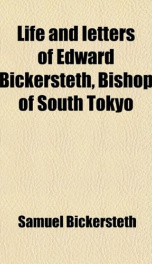life and letters of edward bickersteth bishop of south tokyo

Purchase of this book includes free trial access to www.million-books.com where you can read more than a million books for free. This is an OCR edition with typos. Excerpt from book: 47 CHAPTER III THE CAMBRIDGE MISSION TO DELHI I. The Work ' Certainly I feel, if possible more vividly here than in England, that the Church will never regret any single labourer sent to North India.'Letter of the Rev. Edward Bickersteth to the Rev. R. Bullock at the end of his first year. ' We offer, then, in the name of our friends at Delhi to those who are able to join them the life and the work. We want the best men that Cambridge can give, and we have nothing to offer them but the life and the work.' In these words, on May 24, 1882, speaking at a meeting held by the London Committee in the College Hall, Westminster, Professor Westcott summed up the situation some five years after the Cambridge Mission at Delhi had been in full activity. There is no doubt whatever that Edward Bicker- steth would have cordially accepted the dichotomy thus characteristically drawn between the inner and the outer aspects of the mission which had been undertaken by his University. Indeed, it may well be that the teacher was quoting from his own pupil's words, for writing to Dr. Westcott on September I, 1881, he had closed his appeal: ' Very gladly shall we welcome to a share in our life and work any who, otherwise fitted, will join us in the spirit of our motto " For My sake and the Gospel's."' The phrase 'the life and the work' was so constantly on Bickersteth's lips, and his own example showed howimportant he felt it to maintain the life as well as the work, that the principle involved in the distinction may be said to give the key to his character. He would often point out how choked with care and jejune, work must become unless it is continually fed by the forces which alone refresh the inner life and keep it calm and vigorous. The spirit of the work was more to him than the w...
Info about the book
Author:
Series:
Unknown
ASIN:
B00086FLMS
Rating:
4.5/5 (2)Your rating:
0/5
Languge:
English
Users who have this book
Users who want this book
What readers are saying
What do you think? Write your own comment on this book!
write a commentGenre
if you like life and letters of edward bickersteth bishop of south tokyo try:
Other books by this author
Do you want to read a book that interests you? It’s EASY!
Create an account and send a request for reading to other users on the Webpage of the book!


